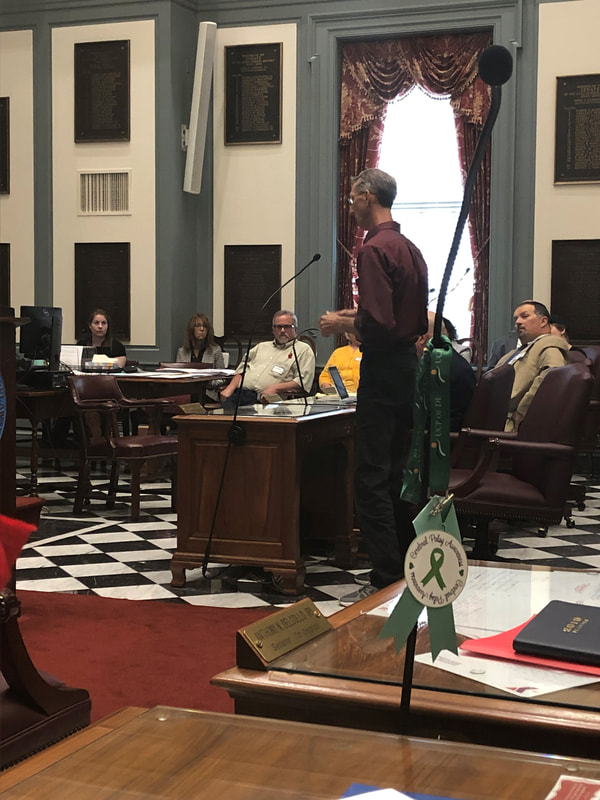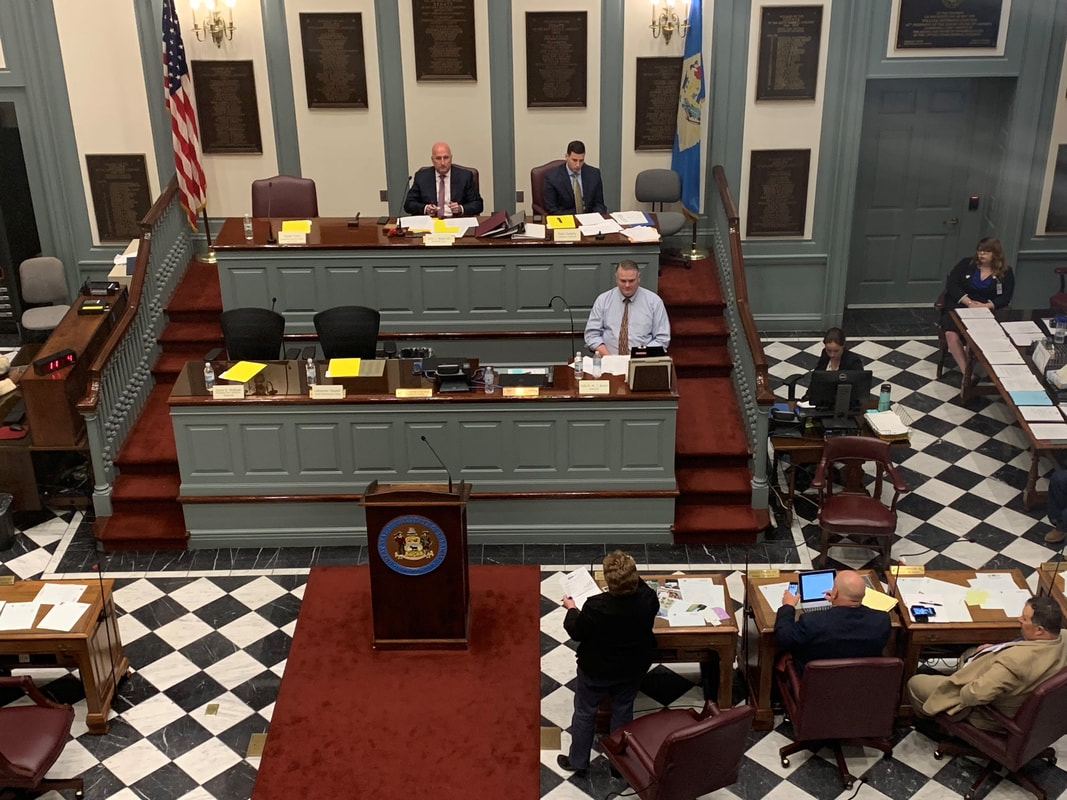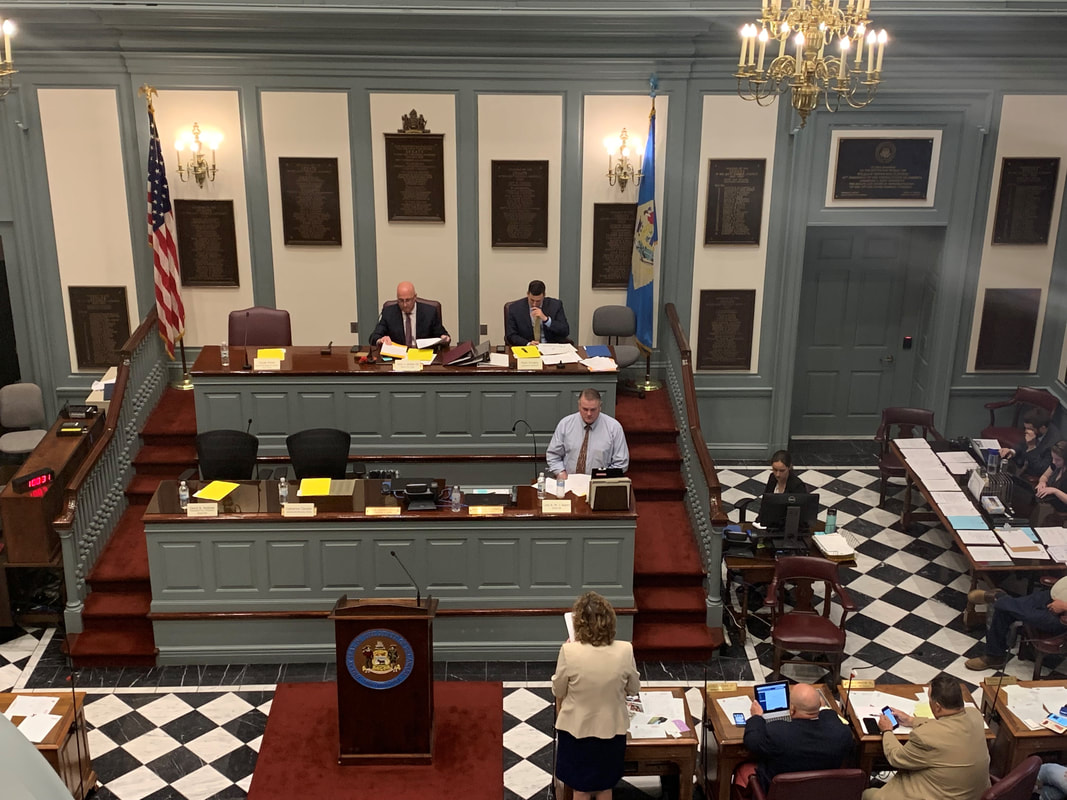 By Tyler Micik The General Assembly returns on Tuesday, January 11th for the second leg of the 151st session. It’s likely a large portion of business will be conducted virtually--at least for the first few months--given the rise in COVID-19 cases due to the Omicron variant. It is an election year and a variety of bills are expected to be considered, all of which offer implications for businesses, large and small, across every industry. Among these proposals are Paid Family and Medical Leave and recreational marijuana legalization which were first introduced last year. As the General Assembly gavels into session next week, the Delaware State Chamber of Commerce offers our 2022 policy priorities, which focus on four pillars that are important to maintaining and creating a healthy business environment in Delaware: workforce, fiscal policy, economic development, and environmental policy. Guided by our leadership and members, these represent our top areas of focus in 2022 and will serve as a roadmap for the policies and regulations we plan to support. Providing us your feedback, sharing your stories, and joining one of our committees is the best way to help us shape policy in the First State. Working together to cultivate an environment where companies can grow and invest in Delaware. This is the best way to secure Delaware’s economic future. Join us.
0 Comments
 Provided by Delaware Technical Community College On August 3, 2020, Governor John Carney signed Executive Order #43 (E043) creating the Rapid Workforce Training and Redeployment Initiative to assist Delaware workers and their families who have lost jobs and income due to the COVID-19 crisis. In partnership, the Delaware Department of Labor, Division of Employment and Training, and Delaware Workforce Development Board issued a funding opportunity to provide guidance on the workforce training services. Through this program, known as the Rapid Workforce Training and Redeployment Training Initiative, Delaware Technical Community College was awarded funding to provide free workforce training in the areas of healthcare, technical training, and transportation between October 2020 and March 2021. All training programs are offered at no cost to students. Healthcare programs include training for certified nursing assistants, hemodialysis technicians, dental assistants, and more. These courses will be offered in partnership with Polytech and Sussex Tech Adult Education divisions. For more information on the healthcare courses, visit http://go.dtcc.edu/WorkforceHealthcare. The technical training and transportation programs include construction technology, HVAC technician, and transportation. More information on these programs can be found at http://go.dtcc.edu/TechnicalTraining. The programs are offered at campuses across the state. Courses are offered in a hybrid format, with students participating in both remote and in-person instruction. “Delaware Tech is proud to offer this training at a time when many Delawareans are seeking educational opportunities to gain skills and access to jobs,” said Paul Morris, associate vice president of Workforce Development and Community Education. “We look forward to working with our partners and the State to provide the high-quality training that our workforce demands.” For more information on all of the Rapid Workforce Training offerings, visit https://www.forwarddelaware.com/. High-speed internet is a ‘must’ for business development and for economic rebound after COVID-199/24/2020  By Mike Quaranta, President, Delaware State Chamber of Commerce Almost overnight, the COVID-19 pandemic shifted much of our lives online — from education and work to healthcare and retail shopping. And remarkably, our broadband infrastructure performed superbly, helping families across Delaware adapt to these seismic changes. But many Delawareans are stuck on the wrong side of the digital divide – lacking a home broadband connection for different and sometimes complicated reasons. It’s a problem that needed to be fixed even before the pandemic, and one that has more urgency now. Although 98 percent of Delaware’s communities are wired for broadband and we have the fastest average internet speeds of any state, only 76 percent of Delaware residents actually subscribe to broadband at home. Many factors contribute to this broadband “adoption gap.” When unconnected Delaware households are asked why they don’t subscribe, more than 60 percent say they just don’t see the need for, or have any interest in, high-speed internet. Sometimes non-adopters may prefer their mobile service. And one quarter of Delawareans don’t have a computer at home. To help address this challenge, most major broadband providers have established programs to offer low-cost broadband ($10 to $15 per month) to low-income customers together with crucial digital literacy training and discounted computers to help spark interest. These programs have helped millions of low-income Americans get online over the past decade, including many right here in Delaware. And since the start of the pandemic, many providers have gone farther – opening up Wi-Fi hotspots to the public and even offering free home service for the most vulnerable customers. Still, we need to better understand why broadband has failed to capture the imagination and interest of so many across our state, despite the widespread availability of subsidized discount programs. This is a critical sociological issue we need to solve. In addition, in some of our state’s rural, downstate communities, the problem is less about broadband adoption rates than with broadband availability. Longer distances and fewer customers-per-mile make broadband infrastructure cost-prohibitive without public investments. Here in Delaware, Governor John Carney’s effort to bring wireless broadband to over 127,000 homes and businesses in Sussex and Kent counties was an important step forward. More recently, Delaware’s Department of Technology & Information (DTI) and Department of Education have committed over twenty million dollars of CARES Act funding to help fast-track broadband infrastructure and adoption programs in rural downstate communities. But like rural electrification a century ago, this rural deployment challenge is national in scope, and requires a national response. This isn’t a problem Delaware should be left to solve on its own; the federal government also needs to step up more. Congress spent tens of billions over the past decade trying to connect rural America but has made little progress – over 20% of rural Americans still have no access to wired broadband. The last rural deployment effort launched by the 2009 stimulus bill was half-baked in conception and poorly executed, with billions of taxpayer dollars diverted to build duplicative networks in communities that already had high-speed service, instead of being prioritized for unserved areas. The federal government’s internal watchdog office criticized the ham-handed effort: “We are left with a program that spent $3 billion, and we don’t really know what became of it,” Government Accountability Office (GAO) investigator Mark Goldstein said at the time. This fall, the Federal Communications Commission will try again with a new $20 billion effort to deploy broadband in rural communities. This time, we need to be smarter. Congress needs to focus federal funds where the problem is greatest: areas that currently have no fixed broadband service, including some in Sussex and Kent Counties. To further buildout rural broadband, we also need to reform the eligibility rules to encourage more competition among broadband builders vying for federal construction contracts. The current, outdated rules, written almost 25 years ago, allow some state and local regulators to steer funds toward their favored providers, instead of those best equipped to get the job done right. Finally, we need accountability: the Feds should tell us how communities will get needed broadband and in what year – and then set up a system to ensure the goals are met. Too often, pie-in-the-sky rhetoric has been followed by an empty bag of results. We need to get universal broadband in each and every Delaware community, and get every home to actually sign up. It’s critical for us to compete globally, to grow our local economy, and to address longstanding social and economic inequities. We can’t afford to wait any longer. By James DeChene
There is a fascinating article in the Wall Street Journal Thursday edition that sheds more light on Amazon’s ultimate decision to abandon New York from the corporate headquarters competition to instead build in northern Virginia. Delaware, along with every state and metro area competing for development, can learn a thing or two on how companies react to how they are perceived when making expansion decisions. The crux of the article focuses on Amazon’s “burn book," a Microsoft Word file of all the public statements made by elected officials and other leaders who stood in opposition to the project. Ultimately used as evidence to back up the decision to give up on New York, it highlights the importance that words, public perception, and overall feedback is weighed when making important decisions. In Delaware we pride ourselves on our size, our intimacy, and the ability to gather all the necessary players in the room quickly and easily to successfully woo companies here. That still leaves the other side of the coin to be dealt with, the court of public opinion. When companies are excoriated to “pay their fair share” (whatever that means), are accused of not being good corporate citizens for not blindly acquiescing to the latest trend that hits a company’s bottom line, and made to feel like nothing more than an ATM machine dispensing directly into state coffers, that’s where problems rise. In the next year I expect a number of debates happening in this court of public opinion where these claims will be thrown about. From finding ways to deal with the cost of healthcare and how employee coverage is paid for, to new forays into labor law that will ultimately cost companies time, effort and resources to adjust to, to continued calls for increases in gross receipts taxes, licensing fees and other revenue generators, the perception of the business community will increasingly be under scrutiny. Delaware’s size is certainly an important asset in attracting companies here, and without annexing land on the Delmarva Peninsula, its size will stay the same. What needs changing is how businesses are viewed and recognizing their positive impacts on Delaware’s economy and long term success, and taking measures to make sure they remain successful and grow. Without that, we may as well put up “I Love NY” signs at our borders. Good news this week from Milford and Smyrna as the Delaware State News highlighted a number of development projects stemming from the Downtown Development Program. The five-year-old program was designed spur economic development in targeted downtowns throughout Delaware in need of revitalization. Of particular note the article stated, “The 12 projects announced Thursday, with nine taking place in Wilmington, received $5.5 million in rebates leveraging $103 million in total investment.”
Also this week, the National Lieutenant Governors Association was in town, hosted by Lt. Governor Bethany Hall Long. The meeting featured a number of topics that related to Delaware—how states have successfully leveraged FEMA in disaster relief, innovative ways to address the ongoing opioid crisis, how states are working with private employers and associations to address the jobs needs across the country (it’s estimated there are 7.3 million jobs currently available—more than the available unemployed workforce), and how criminal justice reform is helping bring ex-offenders into the workforce and stemming recidivism. In the coming weeks the Council of State Governments and the National Council of State Legislatures will be meeting, and I hope to get feedback from local attendees on any trending policy initiatives that could Delaware could see next year. Stay tuned. by James DeChene This week, the last of this session saw a few bills of importance to the business community being either introduced or worked. One is SB 71, a bill that would mandate that all future pharmacies run in Delaware be owned and operated by a pharmacist or an entity comprised of a majority of pharmacists. This would have serious impacts on the pharmacy, developer and construction industries in Delaware, as chain pharmacies, grocery stores and stores like Walmart and Target would no longer be able to run their pharmacies themselves, and would instead have to lease out space to pharmacists/pharmacist groups if they wanted one in their store. This would have a chilling effect on future development and expansion of these entities in Delaware, including potentially putting the kibosh on the proposed Wegmans in Barley Mill. The State Chamber and others have asked for the bill to be delayed until next year so that we can work toward a compromise. More to come. Two bills involving tipped workers and minimum wage were introduced this week. One would raise the tipped worker minimum wage to 65% of the current minimum wage, and the other would govern how tips are reported and paid out by an employer. The State Chamber is currently reviewing these bills with industry organizations and representatives to judge their impact. The Senate passed the Bond bill late Thursday night, totalling $816MM for FY19 and $862.9MM for FY20, where it now faces a vote in the House. The General Assembly will meet on Sunday and into Monday as they finalize the last minute spending bills (bond and grant in aid) and work to get their last minute must-haves passed. Look for an update Monday on the big ticket items accomplished. by James DeChene This week in Dover the major bill impacting the business community was SB105, which will raise Delaware’s minimum wage to $15. We started off the week hosting a teletown hall with over 50 members joining to hear the latest on timing and strategies, and a number of businesses joined us in Dover to make comment on the bill at the Senate Labor Committee. The stories business leaders shared during the committee meeting were compelling and varied, and included entities ranging from nonprofits to small and medium sized businesses from bakeries to a small business sign maker. Ultimately the bill was released from committee and has now been assigned to Senate Finance Committee due the bill’s significant fiscal note. If you have not taken the opportunity to contact your senator on this bill, I urge you to do so by visiting our Action Network page. Other bills of note: The passage of a Chamber-backed bill in SB61, which would create a Transportation Infrastructure Investment Fund (TIFF) to help expedite commercial and industrial development projects. Released out of committee was SB74. This bill would make a technical change to the New Economy Jobs credit making it easier and more likely businesses will be able to take advantage of the credit. Moving forward, there are 7(!) legislative days left this session. DEFAC will meet next Wednesday to announce the final forecast numbers that will dictate how much money will be allocated to the bond and grant-in-aid bills. members testifying against sb105 on june 12:
by James DeChene
This week was the first in the four-week sprint to June 30. Highlights this week included: HB110, the legalization of marijuana bill was released out of House Revenue and Finance committee. DSCC remains opposed to the bill for reasons such as restrictions in how employers can create employment policies surrounding marijuana use, the current difficulty for employers finding qualified applicants that can pass a drug screen (which we think will be exacerbated by legalization) and the lack of a spot test for impairment. SB105, the bill that would raise Delaware’s minimum wage to $11 in January 2020 and then by a dollar each year until it hits $15 in 2024 (with an imbedded escalator to raise with cost of living), was tabled in committee this week, HOWEVER, it will be heard in Senate Labor Committee next Wednesday, June 12. This will be one of the Key Votes (along with HB110) that DSCC will be using when making the decision on whether to support candidates. Also this week was the State Chamber’s End-of-Session Brunch. Attendees heard from Tim Holly, chair of the DSCC Employer Advocacy Committee, on HB110, from Gary Stockbridge, DSCC Chairman, Chair of the Delaware Workforce Development Board (DWDB) and President of Delmarva Power, on what the DWDB is up to and how members can help in workforce training. We then heard from Solomon Adote from the Delaware Department on Technology & Information on the Cyber Security Council and the work they are doing to develop best practices on how to combat cybersecurity threats. Rounding out the morning were remarks from House Speaker Pete Schwartzkopf on what to expect in June, including legislation on clean water, medical and recreational marijuana, education investments and how the state budget is shaping up. Senate President David McBride offered his perspective including acknowledging efforts by the General Assembly and the State Chamber to help provide economic development opportunities in Delaware. He also discussed what the Senate will be working on, including minimum wage in committee, education and transportation infrastructure investment by James DeChene
HB110, the bill that would legalize recreational marijuana, will be heard in the House Revenue and Finance Committee on Wednesday, June 5, at 2:30 p.m. Those members who have concerns over what legalized marijuana will mean to their business and their employees should come to Dover and tell committee members about the impact this legislation will have if passed. To recap, the bill:
Each speaker can expect to have two minutes to speak—including introducing themselves and their organization, the number of employees you have, and the impacts the bill will have. I am happy to help guide you through this process. Please let me know as soon as possible if you plan to attend. In other news this week, DTI and Bloosurf announced a partnership to bring broadband to areas in Sussex, Kent and southern New Castle counties over the next 18-24 months. This is an initiative the Chamber has been very supportive of, and we are looking forward to the economic development opportunities that will come as a result of this investment. The General Assembly is back in session next week, and 13 legislative days remain. Expect a flurry of bills to be introduced, including a clean water infrastructure bill and more to come on a potential minimum wage increase bill. by James DeChene
Legislative Rosters! Rosters are here! For those interested in purchasing, please email Linda Walsh at [email protected]. This week a bill raising the purchase age of tobacco products passed the Senate, and now goes to the House to be heard in committee. The Chamber is in the process of reviewing the 19 criminal justice reform bills announced last week and the impact they may have on employers. More info to come. Next week we expect the Youth and Training Wage repeal bill to be heard in the House Economic Development, Business and Insurance committee on Wednesday at 2:30. If this bill impacts your business, please make plans to attend and comment. For more information on the bill, you can email me at [email protected]. |
Archives
July 2024
Categories
All
|
|
Copyright Delaware State Chamber of Commerce, Inc.
All Rights Reserved. PO Box 671 | Wilmington DE 19899 (302) 655-7221 | [email protected] | sitemap |
|




 RSS Feed
RSS Feed